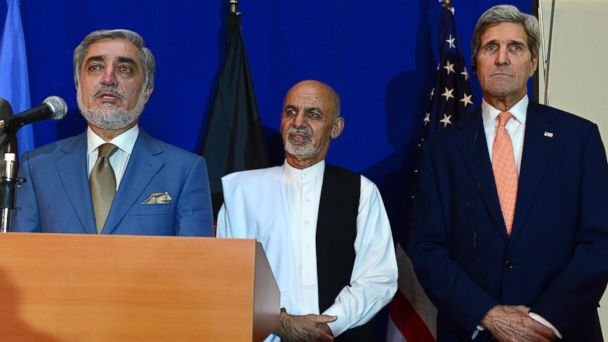Why John Kerry Made a Secret Trip to Afghanistan

(Photo Credit: Wakil Kohsar/AFP/Getty Images)
As the clock ticks toward a major conference in which NATO leaders will make decisions about commitments to Afghanistan, U.S. Secretary of State John Kerry announced at the end of a surprise visit there that the two remaining presidential candidates have smoothed out disagreements that had delayed the process of picking a new leader.
The two hopefuls, Ashraf Ghani and Abdullah Abdullah, have about three weeks before the NATO conference in Wales to agree on the formation of a national unity government, while at the same time waiting for the results of an audit of all 8 million votes from a disputed June runoff election.
John Kerry Acts As Translator for Angolan Vice President
US Fuming Over Israeli Criticism of Kerry
Afghan Candidates Agree to Resolve Dispute
Speaking to reporters after his meetings with the candidates today, Kerry expressed optimism that the two men will accomplish the ambitious task before them.
"Both candidates have defined a road to a unity government," he said. "They will begin now to meet together and map out that transition ahead."
Kerry's secretly arranged trip to Afghanistan was his second in a month, the first in mid-July, when he got Abdullah and Ghani to agree to an audit of 100 percent of the June votes, after they each accused the other of election fraud. The two were also supposed to begin hammering out the details of a unity government then, regardless of who prevailed after the audit was completed.
But disagreements over the technical aspects of the audit, run by the Afghan Independent Election Commission and overseen by the United Nations, as well as disputes over the power-sharing structure of the new government, slowed the entire process down to a near halt.
The candidates have resolved the auditing differences and signed a communique agreeing to work on the structure of a long-term power-sharing government, they said Friday.
Kerry dismissed the notion that this agreement would invite discussion of a new form of Afghan government, including a parliamentary system, favored by Abdullah, or a stronger presidency, Ghani's preference.
Rather, he said, the immediate future would see the winner of the audited election become president and the loser appoint a kind of CEO whose position would eventually morph into a prime ministerial role after consultation with a loya jirga, or grand council.
"It does not establish a parliamentary system, it does not change the role of the president as head of government, but it does create the new position of the chief executive who will help to manage and work together to bring people onto the same path and create efficiency and modernity in governance," Kerry said of the deal.
Even if the candidates agree in principle to a power-sharing agreement, they won't be able to put it into practice until the new president is inaugurated, meaning there could be continued uncertainty until that point, said Shuja Nawaz, the director of the South Asia Center at the Atlantic Council in Washington.
"The candidates may agree in principle on the division of ministries, for instance, but the relationship between the two candidates is going to be left up in the air until the final result is announced and agreed upon," he said.
To speed up the audit process, a senior administration official said Thursday that the United States expects an additional 70 United Nations Development Program election advisers to arrive in Kabul in the next few days.
"It is possible. It'll be hard," the official said.
Officials have stressed the importance of getting a new president inaugurated by the NATO conference, because that individual will be in charge of making a sales pitch to member countries about the alliance's post-2014 commitments to Afghanistan.
"The Afghans need to be represented at the NATO summit by their president who has legitimacy," Marc Grossman, the U.S. State Department's special representative to Afghanistan and Pakistan from 2011 to 2012, said. "People are making decisions in capitals now about what to do on January 1, 2015."